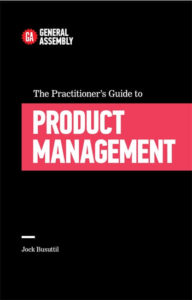
PRODUCTHEAD: Hieranarchy
PRODUCTHEAD is a regular newsletter of product management goodness,
curated by Jock Busuttil.
pyramid product
tl;dr
Hierarchy in organisations appeals to our innate need for stability, but turns us into ego-driven and needy children
Nature abhors a hierarchy. What if there was a viable alternative way to organise ourselves?
Valve Corporation shows new employees how an organisation can operate without hierarchy
hello
If my cursory Google search is anything to go by, I’ve just coined a new word: hieranarchy. It describes the illusion that the people notionally in charge are in control, and the dysfunction that typically characterises most organisations. I think every organisation I’ve worked at has been a hieranarchy to a certain degree.
So this week, I’ve been thinking about organisational structures and what alternatives we have. Like many things, the structure itself isn’t necessarily the problem. Rather, it’s the undesirable behaviours that result from people trying to game the system, get ahead of their peers and climb the corporate ladder.
The first article I’ve shared with you below is a good starting point. Harold J. Leavitt wrote in 2003 about why hierarchies continue to thrive, despite all the negative connotations.
On the one hand, hierarchies provide us with a way to define our identity relative to our role and position in an organisation, and provide us with the structure and routine we seem to crave as individuals.
On the other, hierarchies encourage us to devote a significant amount of time and effort to playing politics, rather than on focusing on doing good work. Our innate desire for stability and routine seems to become conflated with being treated like children who need to be told what to do, rather than behaving like autonomous adults. So we can at least understand why we keep falling back to hierarchies to organise ourselves, despite their dysfunctionality.
Even author of Reinventing Organizations Frédéric Laloux thought before conducting his research that only at most 4-5 people could operate without hierarchy, but for larger groups you would need structure. What he found was that in larger organisations, yes, you do need a type of structure, but you don’t need a boss.
In situations of low complexity, a hierarchy can work. In more complex scenarios, hierarchy doesn’t work as an organisational structure, in part because hierarchies force all that complexity up to the top for decision-making and direction. In nature, whether at the cellular or ecosystem level, complex systems co-operate and function successfully without a ‘boss’ or ‘management team’ at the top directing operations.
Laloux discovered a number of organisations transcending hierarchy in this way. These companies adopted a structure more akin to complex systems in nature. He found they tended to operate on three breakthrough principles:
- Self-management: where people have no boss, and everyone is truly empowered and autonomous, and start behaving like adults, not children;
- Wholeness: encouraging people to bring their whole authentic, vulnerable selves to work, rather than only the small, ego-driven aspect of ourselves that constitutes our ‘work persona’; and
- Evolutionary purpose: to think of an organisation not as an inanimate machine to programme, or a ship to be steered by the leadership, but rather as a something more akin to a living entity that naturally wants to evolve towards a particular higher-order goal, and facilitating that through stewardship.
His approach is one that appeals a great deal to me, but Laloux himself calls out examples of organisations that were successfully operating in this manner, only to regress back after a change of leadership. Similarly, there are companies that went half-way and ditched hierarchy without a coherent system ro replace it.
It would seem that it is easier to start a new company from scratch that embodies these principles, than it is to convert the culture and structure of an existing organisation wholesale. But that doesn’t stop us from trying.
Lastly, I’ve included a link to Valve Corporation’s Handbook for New Employees, which encourages with gentle humour many of the principles Laloux describes. In particular, I like their description of team leads:
Often, someone will emerge as the “lead” for a project. This person’s role is not a traditional managerial one. Most often, they’re primarily a clearinghouse of information. They’re keeping the whole project in their head at once so that people can use them as a resource to check decisions against. The leads serve the team, while acting as centers for the teams.
Valve’s Handbook for New Employees
Sound familiar?
Speak to you soon,
Jock
what to think about this week
Why Hierarchies Thrive
The intensity with which we struggle against hierarchies only serves to highlight their durability. Even today, just about every large organisation remains hierarchical. Harold J. Leavitt, author of Hot Groups, explains why.
Neither a defence nor an attack
[HARVARD BUSINESS REVIEW]
Reinventing Organizations
Frédéric Laloux gives a talk summarising the key themes (self-management, wholeness and evolutionary purpose) and case studies from his book, Reinventing Organizations and takes questions from the audience.
Make your organisation heart-centred
[FRÉDÉRIC LALOUX / YOUTUBE]
Valve’s Handbook for New Employees
This book isn’t about fringe benefits or how to set up your workstation or where to find source code. Valve works in ways that might seem counterintuitive at first. This handbook is about the choices you’re going to be making and how to think about them. Mainly, it’s about how not to freak out now that you’re here.
[VALVE CORPORATION]
Don’t miss out on my Product Management Masterclass
You still have time to grab tickets to the remaining sessions in my live, conference-style sessions running on Tuesdays in October.
6 Oct: What Do Product Managers Do (And Not Do)?13 Oct: Understanding User Needs- 20 Oct: The Secrets of Meaningful Product Roadmaps
- 27 Oct: Landing and Starting Your Product Manager Job
Each session is USD $20 to attend.
recent posts
The black art of designing content
While distracting myself from doing real work this week, I learnt the phrase ‘black art’ comes from the world of printing presses. So I delved deeper into the world of content design. Eventually I found a product management angle.
Fonts, content and solid user research
[I MANAGE PRODUCTS]
Open, honest and always improving
In government, product is borne out of transparency, quite a lot of cake and a fanatical desire to serve the needs of users.
In this recent video for ProdPad’s webinar series, I talk about the acute challenges of culture clash. You’ll also discover what can be achieved by highly motivated, principled and capable people when they set an example for the rest of an organisation – or the entire Civil Service – to follow.
Product management with revenue out of the picture
[I MANAGE PRODUCTS]
Voxgig Fireside for professional speakers
In the podcast episode, I reveal how I turned my flair for product management into a speaking career, and how I set up a home studio for live streaming using an old television.
[I MANAGE PRODUCTS]
Growing together: developing and retaining your product team
34% of product managers surveyed said they left their previous role because there were no opportunities to grow.
In this video, Lucie McLean (Zalando) discusses growth and career progression for product managers with Jock Busuttil (Product People Limited) and Daniil Pavliuchkov (Tier).
Team coaching and career paths
[I MANAGE PRODUCTS]
upcoming talks and events
20th October 2020, 15:00 BST / 10:00 EDT
Product Management Digital Masterclass
The Secrets of Meaningful Product Roadmaps
Tickets
27th October 2020, 15:00 GMT / 11:00 EST
Product Management Digital Masterclass
Landing and Starting Your Product Manager Job
Tickets
can we help you?
Product People is a product management services company. We can help you through consultancy, training and coaching. Just contact us if you need our help!
Helping people build better products, more successfully, since 2012.
PRODUCTHEAD is a newsletter for product people of all varieties, and is lovingly crafted from worrying and compelling docudramas.
We’ve included a couple of affiliate links to Amazon this week, which means we receive a small commission on any purchases you make.


Leave a Reply